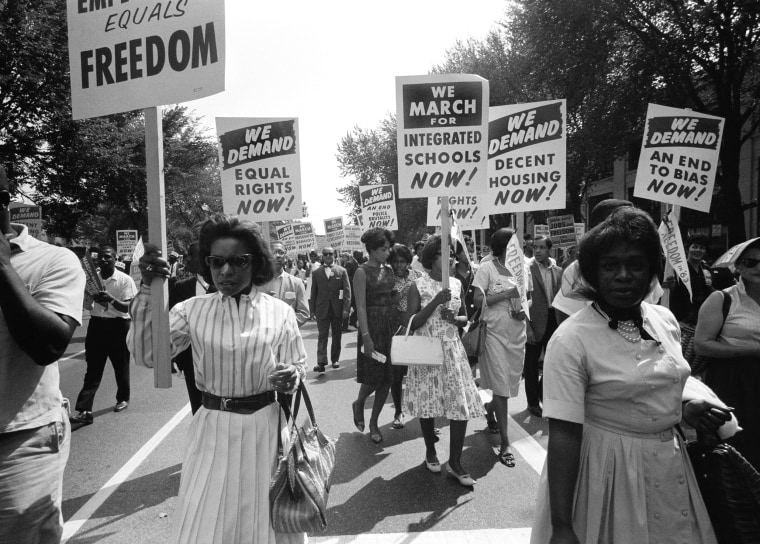Federally-enforced desegregation busing — one of the most heated policy debates of the 1970s — has taken center stage in the Democratic primary after a tense exchange between former Vice President Joe Biden and Sen. Kamala Harris, D-Calif., during Thursday's Democratic debate.
Now, candidates across the board are being asked for their position on the issue presently, as schools across the country remain largely segregated to this day.
On Sunday, Sen. Bernie Sanders, a 2020 presidential contender, told ABC's "This Week" he thinks the "resegregation" of schools and communities "is a very serious problem."
"We need to build public education in this country," Sanders said. "We need to make sure kids go to community schools which are integrated, and that means we have to focus on fair housing legislation and enforcement. Busing is certainly an option that is necessary in certain cases, but it is not the optimal."
"Does anybody think it's a good idea to put a kid on a bus, travel an hour to another school, into another neighborhood that he or she doesn't know? That's not the optimal," Sanders continued. "What is the optimal is to have great community schools which are integrated. That's what I think most people want to see, that's what I want to see."
Sanders, along with Sen. Elizabeth Warren, a fellow 2020 presidential candidate, co-sponsored the Strength in Diversity Act, which would provide $120 million to bolster local integration efforts in public schools, including busing. As is, Section 426 of the General Education Provisions Act prohibits federal funding of desegregation, though there are some exceptions.
Warren, asked Friday at a Rainbow/PUSH event in Chicago about her stance on busing, told reporters that she has "already supported legislation that uses busing as a way to help diversify communities and strengthen communities."
"I'm already on the record on busing and using busing as a way to help communities that are diversified," she said.
Meanwhile, following Thursday's debate, Harris spokesman Ian Sams said on Twitter that the senator supports busing for school integration currently.
In a 1999 Gallup poll on desegregation busing, the overwhelming majority of Americans were opposed to the practice. One of the biggest problems with the program — as Sanders noted — was that African-American children were being bused at great lengths to attend white schools. The recent school integration debate focuses more heavily on the battle between public and charter schools and on efforts to desegregate communities as a whole.
The busing issue — which Biden figured prominently in as a senator in the 1970s — came to the forefront after Harris pushed him Thursday to address his position. In that exchange, Harris said Biden worked with segregationist senators "to oppose busing," adding that a local busing program allowed her to attend an integrated school and obtain a good education.
Biden pushed back, saying she mischaracterized his position "across the board" and highlighted his broad support of civil rights.
"I did not oppose busing in America," Biden said. "What I opposed is busing ordered by the Department of Education. That’s what I opposed."
To many, Biden's explanation sounded a lot like the "states rights" defense that opponents to civil rights enforcement have cited for decades.
Sen. Cory Booker, another 2020 Democratic presidential candidate, said Sunday on NBC's "Meet the Press" that "whoever our next president is going to be, really needs to be someone who can talk openly and honestly about race."
"I'm not sure if Joe Biden is up to that task given the way the last three weeks have played out," he added in reference to Biden's exchange with Harris and his recent citing of the working relationships he had with two Democratic segregationist senators early in his Senate career.
Also on "Meet the Press," former Housing and Urban Development Secretary Juliàn Castro, a 2020 Democratic presidential contender, said Biden's stance on busing "is relevant" to the 2020 debate.
"What I took as his position of he allowed local communities to make a decision — essentially relying on states rights," Castro said. "I think he's going to have to continue to explain why that was a good position because we've had very painful history in his country of trying to desegregate communities."
Speaking Friday in Chicago at the Rainbow/PUSH event, Biden claimed he "never, never, never opposed voluntary busing" like the program Harris participated in, adding that he has "always been in favor of using federal authority to overcome state-initiated segregation."
Biden has previously called busing "an asinine concept, the utility of which has never been proven to me" and a "liberal train wreck." In a 1975 interview with NPR, Biden supported a constitutional amendment to end federally-mandated busing.
This weekend, the issue was also brought up to President Donald Trump during his trip overseas at the G20 summit. Asked about busing, Trump seemed not to fully understand the issue as he discussed busing as a common way to transport children to school.
"Well, it has been something that they’ve done for a long period of time. I mean, you know, there aren’t that many ways you're going to get people to schools," Trump said. "So this is something that's been done. In some cases, it's been done with a hammer instead of velvet glove. And, you know, that’s part of it.
"I think if Vice President Biden had answered the question somewhat differently, it would've been a lot — it would've been a different result," he said. "Because they really did hit him hard on that one. ... But it is certainly a primary method of getting people to schools."

